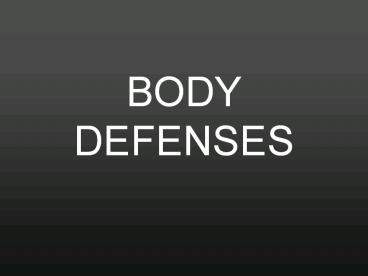BODY DEFENSES PowerPoint PPT Presentation
Title: BODY DEFENSES
1
BODY DEFENSES
2
(No Transcript)
3
NON-SPECIFIC DEFENSES
- CELLS AND CHEMICALS
- a. Interferon-
- b. Complement-
- c. Phagocytes-
- d. Natural Killer (NK) Cells-
4
THE LYMPHATIC SYSTEM
- Consists of two independent parts
- 1. meandering network of lymphatic vessels
- 2. various lymphoid tissues and organs
5
(No Transcript)
6
1. LYMPHATIC VESSELS
7
(No Transcript)
8
2. LYMPH NODES
9
(No Transcript)
10
SWOLLEN GLANDS
11
OTHER LYMPHOID ORGANS
- SPLEEN-
- THYMUS GLAND-
- TONSILS-
- PEYERS PATCHES-
- MALT
12
SO WHAT DO WE KNOW????????
13
SPECIFIC BODY DEFENSESTHE IMMUNE SYSTEM
- stalks and eliminates with nearly equal
precision almost any type of pathogen that
invades the body
14
IMMUNE RESPONSE
- Tremendously increases inflammatory response
- Provides protection specifically targeted against
specific antigens - Primes body to react more vigorously to later
meetings with the same antigen
15
WHATS AN ANTIGEN???
- WHATS A SELF-ANTIGEN???
16
Small molecules are not usually antigenic but
- Allergy
- Hapten or incomplete antigen
17
3 IMPORTANT ASPECTS OF THE IMMUNE RESPONSE
- It is antigen specific
- It is systemic
- It has memory
18
Two separate but overlapping arms of
immunity1.) Humoral or Antibody-mediated immun
ity2.) Cellular or Cell-mediated immunity
19
CELLS OF THE IMMUNE SYSTEM
- LYMPHOCYTES
- T cells- provide cell- mediated immunity, do NOT
produce antibodies - B cells- provide humoral immunity, DO produce
antibodies
20
Lymphocyte Differentiation
21
Immunocompetence
- What is it?
- How do T cells become immunocompetent?
- What about B cells?
- Immunocompetence develops before exposure to
antigens- what does this mean???
22
MACROPHAGESbig eater
23
Macrophage with lymphocyte riding piggy back
approaching streptococcus bacteria
24
Effectiveness of immune response depends upon
- Ability to recognize foreign antigens and
- bind to them
- 2. Ability of cells to communicate with one
- another so whole immune system can
- respond
25
HUMORAL AND CELL-MEDIATED IMMUNITY
26
ANTIBODIESIMMUNOGLOBULINS
PowerShow.com is a leading presentation sharing website. It has millions of presentations already uploaded and available with 1,000s more being uploaded by its users every day. Whatever your area of interest, here you’ll be able to find and view presentations you’ll love and possibly download. And, best of all, it is completely free and easy to use.
You might even have a presentation you’d like to share with others. If so, just upload it to PowerShow.com. We’ll convert it to an HTML5 slideshow that includes all the media types you’ve already added: audio, video, music, pictures, animations and transition effects. Then you can share it with your target audience as well as PowerShow.com’s millions of monthly visitors. And, again, it’s all free.
About the Developers
PowerShow.com is brought to you by CrystalGraphics, the award-winning developer and market-leading publisher of rich-media enhancement products for presentations. Our product offerings include millions of PowerPoint templates, diagrams, animated 3D characters and more.

